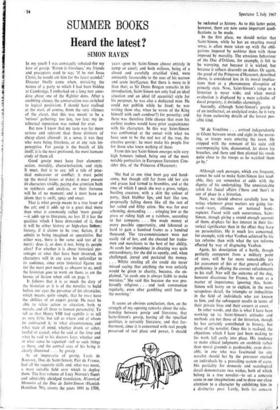Heard the latest ? SUMMER BOOKS
SIMON RAVEN
In my youth I was constantly rebuked.far my love of gossip. 'Raven is frivolous,' my friends and preceptors used to say; `if he met Jesus Christ, he would ask him for the latest scandal.' Disaster finally came when, mistaking the nature of a party to which I had been bidden at Cambridge, I embarked on a long new anec- dote about one of the flightier dons. After a snubbing silence, the conversation was switched to logical positivism. I should have realised at the start, of course, from the very vileness of the claret, that this was meant to be a `serious' gathering; too late, too late; my in- tellectual reputation was ruined for ever.
But now I know that my taste was far more serious and relevant than those drinkers of cheap claret allowed : in a sense, it was they who were being frivolous, or at any rate im- perceptive. For gossip is the breath of life itself; it is the most profound, the most humane study of them all.
Good gossip must have four elements: action, morality, characterisation, and style.
It must, that is to say, tell a tale of prac- tical endeavour or conflict; it must point up the moral issues at stake; it must present its characters vividly, paying due attention both to synthesis and analysis, or their fortunes will be of no moment; and it must have an idiom that is swift, spicy and exact.
That is what gossip means to a true lover of the art; and it adds up to a great deal more than what is commonly called `mere gossip' —it adds up to literature, no less. If it has the qualities which I have demanded of it, then it will be either history or high-class &Mon: history, if it claims to be true; fiction, if it admits to being imagined or speculative. But either way, there is the same acid test of its merit: does it, or does it not, bring its people alive? For whether it is about historical per- sonages or ones that have been invented, its characters will in any case be unfamiliar to its audience, since even historical figures are for the most part nearly as obscure to us, until the historian goes to work on them, as are the heroes of fiction when still on page 1.
It follows that it is as much the duty of the historian as it is of the novelist to build before our eyes the personae of his chronicles; which means, quite simply, that he must have the abilities of an expert gossip. He must be able to relate action to situation, both to morals, and all three to human personality: To tell us that Henry VIII had syphilis is to tell us very little; but tell us where and of whom he contracted it, in what circumstances, and what state of mind, whether drunk or sober, lustful or casual, what he said at the time and what he said to his doctors later, whether and in what sense he repented—tell us such things as these, and the central area of his being is clearly illumined . . . by gossip.
As an impresario of gossip, Louis de Rouvroy, Duc de Saint-Simon, Pair de France, had all the requisite skills and, what was more, a most suitable field over which to deploy them. The first volume of Lucy Norton's fluent and admirably abridged translation, Historical Memoirs of the Duc de Saint-Simon (Hamish Hamilton 70s), covers the years 1691 to 1709,
years spent by Saint-Simon almost entirely in camp or court; and both milieux, being of a closed and carefully stratified kind, were eminently favourable to the uses of his narrow and acute intelligence. But there is more to it than that; as Sir Denis Brogan remarks in his introduction, Saint-Simon not only had an ideal situation and an ideal (if eccentric) style for his purposes, he was also a dedicated man. He could not publish while he lived; he was writing (how else, when he wrote of the King himself with such candour?) for posterity; and there was therefore little chance that even his earliest readers would have prior acquaintance with his characters. In this way Saint-Simon was confronted at the outset with what we have seen to be the real test of the true, the creative gossip: he must make his people live for those who knew nothing of them.
From this test Saint-Simon emerges with very high honours indeed, being one of the most notable portraitists in European literature. Con- sider this, of the Princesse d'Harcourt: `She had at one time been gay and hand- some, but though still far from old her airs and graces had turned to brambles, and at the time of which I speak she was a gross, vulgar, bustling creature, with a skin the colour of putty, thick blubber lips, and hair like tow, perpetually falling down like all the rest of her soiled and filthy attire. She was for ever scheming, demanding . . . cringing low as the grass or riding high on a rainbow, according to her company. . . . She made money at every possible opportunity, and laboured as hard to gain a hundred francs as a hundred thousand. The tax-commissioners were not easily rid of her, and she cheated her trades- men and merchants to the best of her ability. At cards her impudence in cheating was quite extraordinary, for she did so openly, and, when challenged, jeered and pocketed the money. . . . Whilst stealing all she could she never missed saying that anything she won unfairly would be given to charity, because, she ex- plained, "at cards one is always liable to make mistakes." She said this because she was pro- fessedly religious . . . and took communion regularly, even after gambling until four in the morning.'
It seems an obvious conclusion, then, on the strength of my opening remarks about the rela- tionship between gossip and literature, that Saint-Simon's gossip, having all the specified qualities, is certainly literature, and that fur- thermor6, since it is concerned with real people possessed of real place and power, it should be reckoned as history. As to this latter point, howevei, there are now some important quali- fications to be made.
In the first place, we should notice that Saint-Simon, while he has an exacting moral sense, is often more taken up with the obli- gations imposed by noblesse than with those imposed by morality. The atrocious behaviour of the Duc d'Orleans, for example, is felt to be worrying, not because it is wicked, but because it reflects discredit on dukes. Or again, the greed of the Princesse d'Harcourt, described above, is considered less in its moral implica- tions than as a phenomenon disruptive of princely state. Now, Saint-Simon's range as a historian is never wide; and when moral evaluation is displaced by a mere calculus of ducal propriety, it dwindles alarmingly.
Secondly, although Saint-Simon's gossip is of an intellectual, an analytical order, he is very far from eschewing details of the lowest pos- sible kind.
`M de Vendome . . . arrived independently at Ghent between seven and eight in the morn- ing, as troops were entering the town. He stopped with the remnant of his suite still accompanying him, dismounted, let down his breeches, and there and then planted his stools quite close to the troops as he watched them go by.'
Although such passages, which are frequent, cannot be said to make Saint-Simon less read- able, they are somewhat at odds with the dignity of his undertaking. The unmistakable relish for faecal affairs (`there and then) is out of place in a historian.
Next, we should observe carefully how he writes whenever great matters are going for- ward—wars, alliances or national bank- ruptcies. Faced with such occurrences, Saint- Simon, though giving a sound enough account of them, displays far less interest in their his- torical significance than in the effect they have on personalities. He is much less concerned, for example, with what Vauban achieved by his tax reforms than with what the tax reforms effected by way of disgracing Vauban.
Again, his description of a battle, though perfectly competent from a military point of view, will be far more remarkable for his assessment of this or that general officer's proficiency in offering the correct refreshments to his staff. Nor will the outcome of the day, however disastrous for France, be seen as a matter of importance; ignoring this, Saint- Simon will hurry on to explain, in the most scrupulous detail, the triumphs or imbecilities in the field of individuals who are known to him, and the subsequent results in terms of their private lives and their careers at court.
In other words, and this is what I have been working up to, Saint-Simon's attitudes and methods are not those of the historian, though he has certainly contributed to history, but those of the novelist. Once this is realised, the objections which I have just been making to his work fall easily into place. His tendency to make ethical judgments on snobbish rather than moral grounds is pardonable, even desir- able, in one who was fascinated (as any novelist should be) by the pressures exerted on individuals by a prevailing system of caste. His partiality for domestic and scatological detail demonstrates two wishes, both of which belong in a true novelist—to set a concrete scene in our imaginations and to draw our close attention to a character by exhibiting him in a distinctive pose. Lastly, both his concern with the individual role and his comparative neglect of the historical event in which that role was played are common form with novelists of every age. To *Thackeray, as to Stendhal, Waterloo was significant for what it did to his characters, not for what it did to Europe . . . an attitude typical of the fic- tioner, and very much the attitude which Saint-Simon adopted to Blenheim.
Saint-Simon, then, was a novelist who never knew it. Nor indeed, given his circumstances, could he ever have been one in practice: for one thing, the form had not yet really emerged; and for another, to write romances would have been most improper in a Duke and Peer of France. But the instinct and the methods were there nevertheless, and we can still enjoy the benefit. For if fiction, like history, is basically gossip, there is this difference—that history is about what men have wrought in the world, while fiction is about what the world has wrought in men.
Since Saint-Simon's interest was in the latter process, his technique was devised, accordingly, to be personal, particular and precise. Its sophistication, its brilliance, its relevance to the problems at hand were such that prominent story-tellers ever since (Proust and Balzac, to name only two) have been eager to learn from it. The more so-called novelists among us who now take a few hints, and the sooner they do so, the better.







































 Previous page
Previous page